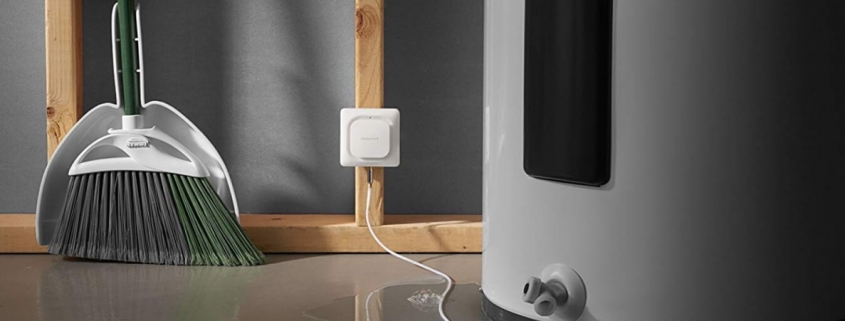Help Prevent Water Damage and Save Money with Flood Detectors
Nothing strikes fear into the hearts of homeowners quite like these four syllables: water damage. To understand how something so pure could be so scary, you need only check the price tag. It reads: Just 1 inch of water can cause $25,000 of damage to your home.
You may be thinking, no big deal, I have home insurance. But be careful.
First, many homeowners’ and renters’ insurance policies don’t cover flood damage. Second, keep in mind when it comes to insurance coverage and water damage, it is not the total damage that matters, but rather how the damage was caused. If it started suddenly and incidentally, such as accidentally hammering a nail through a water pipe while hanging a painting, it may be covered. If the damage is caused by old, slow leaks — for example, your pipes are old — chances are it is not covered (check with your provider for specifics in your state). So those hefty repair costs may be coming straight out of your pocket.
Even if your bill ends up being just $2,000 — less than the average cost according to HomeAdvisor — that’s no small chunk of change. And you may find yourself asking a painful question as you swipe your credit card or crack open your checkbook — could this have been avoided?
How do floods and water damage happen?
If you live in an area prone to flooding, you may already be familiar with how water damage happens.
But for everyone else, some water damage is a result of natural causes, like a flood brought on by heavy rainfall. But it does not always happen that way. Water damage can be caused by:
- A burst pipe
- Cracks in your home’s foundation
- A leaking roof (cracked or old shingles)
- A failing water heater
- An overflowing washing machine
One of the most insidious parts of water damage is that it tends to happen in places that are tucked out of sight, like in a basement or a closet. A leak that started out minor — and was in the beginning relatively easy to fix — can turn into a nightmare if it goes unchecked for too long.
Water sensors make smarter homes
Security is not just about preventing break-ins — although we can certainly help you with that! It is about protecting everything that matters most to you, whether it’s your family, your pets, your business, or your home. And as we just learned, water damage is one the most devastating things that can happen to a home.
Taking proactive steps to prevent water damage is likely to be far less expensive than making repairs after it happens. Luckily, your friendly neighborhood smart security company (that’s us) has a solution: We’re now offering wireless, easy-to-install water sensors (also known as flood detectors) that can really make a difference.
What are water sensors?
A water sensor does exactly what you would guess — it detects the presence of water and alerts you to potential flooding before extensive damage may occur.
If it is part of your professionally monitored security system, it can also signal an alarm to your company’s monitoring center and also send you a notification via text or email.
How do water sensors work?
One of the cooler things about water sensors is their simplicity. They are easy to install, do not need to be plugged in, and, are incredibly small. You also do not have to be an expert to understand how they work.
The flood detector can rest right on the floor, or it can be mounted to a wall or baseboard. When the metal contacts at the base become wet, this completes the circuit.
The transmitter then communicates the signal to your panel, which triggers a notification that you receive. Boyd & Associates’ protection specialists in the monitoring center would read this as an environmental alarm and notify you accordingly to make sure you get the help you need. Easy, right?
It’s also important to understand what flood detectors do not do: They do not make your home flood-proof or water-proof, and they do not “stop” floods or water damage. For example, if you already have a leaky roof, a flood detector will not prevent water from getting in. Rather, the device will instantly alert you when it senses water so you can take action before that leak becomes a big problem.
Where should water sensors be placed?
You will want to place your water sensor anywhere flooding or water damage would be a concern. For example:
- Behind an appliance, such as a washing machine or a refrigerator that makes ice cubes or dispenses water
- In your basement, near the water heater
- Inside a cabinet underneath a bathroom sink
Get proactive with Boyd & Associates
Water damage can cause thousands in home repairs, not to mention the loss of precious personal items. Catching drips and leaks early can mean the difference between a minor inconvenience and major disaster. But no need to worry — being proactive is easier than ever when you add monitored water sensors to your smart home security system.
Call (805) 650-3267 to talk to a Boyd & Associates expert. We’ll give you a free consultation to determine exactly what you need to help protect your world.
- Managing Security for Easter Gatherings & Increased Foot Traffic - April 10, 2025
- Why Homeowners Are Investing in Security Systems in 2025 - March 27, 2025
- Protect Yourself from Tax Season Scams - March 10, 2025



